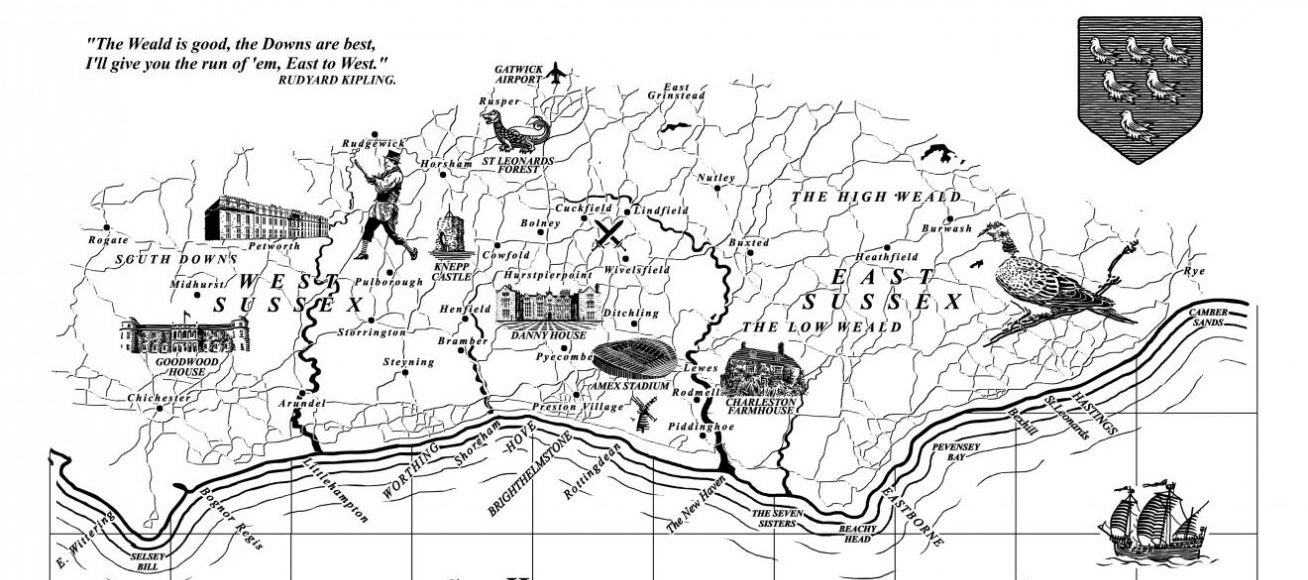The three anarchist pissheads in Chesterton’s strange novel ‘The Flying Inn’ are on the run from the forces of government repression. To amuse the hunted men, their leader, ‘The Captain’, Patrick Dalroy, insists to his companions, the poet and MP Dorian Wimpole, and the landlord of The Old Ship, Humphrey Pump, that they each write a poem accounting for the way the English roads ‘roam about the countryside like rivers.’ He further insists that each of the poems have the same title, viz, ‘An Inquiry into the causes geological, historical, agricultural, psychological, physical, moral, spiritual and theological of the alleged cases of double, treble, quadruple, and other curvature in the English Road.’ Dorian Wimpole (as befits the professional poet of the gang) comes up with the best of the three, which is now much better known as ‘The Rolling English Drunkard,’ and from which I drew much inspiration for the course of ‘The Longest Crawl’. But it is only one of three, and Chesterton clearly hoped that all three would be read, though Dalroy stops Humphrey Pump from reciting his verse to its end, and admits to Dorian that his own effort is ‘a bad poem.’ So for those readers who are interested enough to have got this far, here are the missing two poems. First, Dalroy’s verse;
‘Some say that Guy of Warwick
The man that killed the Cow
And brake the mighty Boar alive
Beyond the Bridge at Slough;
Went up against a Loathly Worm
That wasted all the Downs,
And so the roads they twist and squirm
(If I may be allowed the term)
From the writhing of the stricken Worm
That died in seven towns.
I see no scientific proof
That this idea is sound
And I should say they wound about
To find the town of Roundabout
The merry town of Roundabout
That makes the world go round.
Some say that Robin Goodfellow,
Whose lantern lights the meads
(To steal a phrase Sir Walter Scott
In heaven no longer needs)
Such dance around the trysting place
The moonstruck lover leads;
Which superstition I would scout
There is more faith in honest doubt
(As Tennyson has pointed out)
Than in those nasty creeds.
But peace and righteousness (St John)
In Roundabout can kiss,
And since that’s all that’s found about
The pleasant town of Roundabout,
The roads they simply bound about
To find out where it is.
Some say that when Sir Lancelot
Went forth to find the Grail,
Grey Merlin wrinkled up the roads
For hope that he should fail;
All roads led back to Lyonesse
And Camelot in the Vale,
I cannot yield assent to this
Extravagant hypothesis,
The plain, shrewd Briton will dismiss
Such rumours (Daily Mail).
But in the streets of Roundabout
Are no such factions found,
Or theories to expound about,
Or roll upon the ground about,
In the happy town of Roundabout,
That makes the world go round.’
Dorian Wimpole then reads out ‘The Rolling English Drunkard’, and after his recitation, Dalroy asks Humphrey Pump if he has written a poem. Mr Pump admits that he has, but says ‘I write under a great disadvantage. You see, I know why the road curves about’. And then he reads, as Chesterton notes, ‘very rapidly all on one note:’
The road turned first towards the left
Where Pinker’s quarry made the cleft;
The path turned next towards the right,
Because the mastiff used to bite,
Then left, because of Slippery Height,
And then again towards the right-
We could not take the left because
It would have been against the laws:
Squire closed it in King William’s day
Because it was a right of Way.
Still right; to dodge the ridge of chalk
Where Parson’s ghost it used to walk,
Till someone Parson use to know
Met him blind drunk in Callao.
Then left, a long way round, to skirt
The good land, where old Doggy Burt
Was owner of ‘The Crown and Cup’,
And would not give his freehold up;
Right, missing the old river-bed,
They tried to make him take instead
Right, since they say Sir Gregory
Went mad and let the Gypsies be,
And so they have their camp secure:
And though not honest, they are poor;
And that is something; then along
And first to right – no, I am wrong!
Second to right of course, the first
Is what the holy sisters cursed,
And none defy their awful oaths
Since the policeman lost his clothes
Because of fairies; right again
What used to be High Toby Lane
Left by the double larch and right
Until the milestone is in sight,
Because the road is firm and good
From past the milestone to the wood.
And I was told by Doctor Lowe
Whom Mr Wimpole’s Aunt would know,
Who lives at Oxford writing books,
And ain’t so silly as he looks,
The Romans did that little bit
And we’ve done all the rest of it,
By which we hardly seem to score.
Left and then forward as before
To where they nearly hanged Miss Browne,
Who told them not to cut her down,
But loose the rope or let her swing
Because it was a waste of string;
Left once again by Hunker’s Cleft
And right beyond the elm, and left
By Pill’s, right by Nineteen Nicks
And left -‘
At this point, Dalroy begs for Pump to stop, accusing him of being ‘too scientific’.
And you can’t argue with that.


